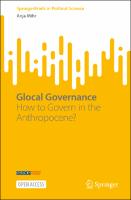Glocal Governance
How to Govern in the Anthropocene?
Abstract
This open access book develops a conceptual framework for glocal governance as a multi-stakeholder local governance approach based on global human rights norms and democratic principles. It discusses glocal governance as part of an ongoing global transformation process that began in the 1990s, when democracy and individualizing responsibilities for governance became the dominant political system worldwide, and continues through today’s dawn of a New Cold War between those countries which have democratized and those which haven’t. This book will intrigue practitioners and scholars alike who are interested in the concepts of glocality and glocalism, local-global connectivity, and the implementation and dissemination of global norms and concepts such as human rights and democracy, at the local and community level as well as among civil society and private enterprises. The author argues that global norms have now become universal benchmarks which private, political, and civil actors use to assess day-to-day situations and market developments, and to make their decisions accordingly. This book will appeal to students, practitioners, and scholars of the social sciences and humanities who are interested in governance, human rights, public diplomacy and international relations; and in conceptualizing mechanisms for governing and enforcing political decisions locally, on the basis of global universal principles, international norms, and laws.


 Download
Download Web Shop
Web Shop